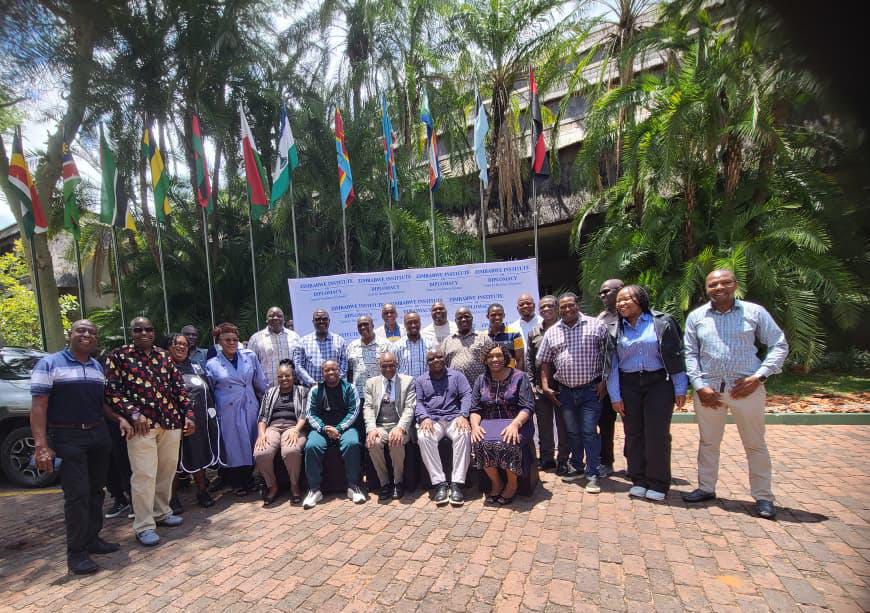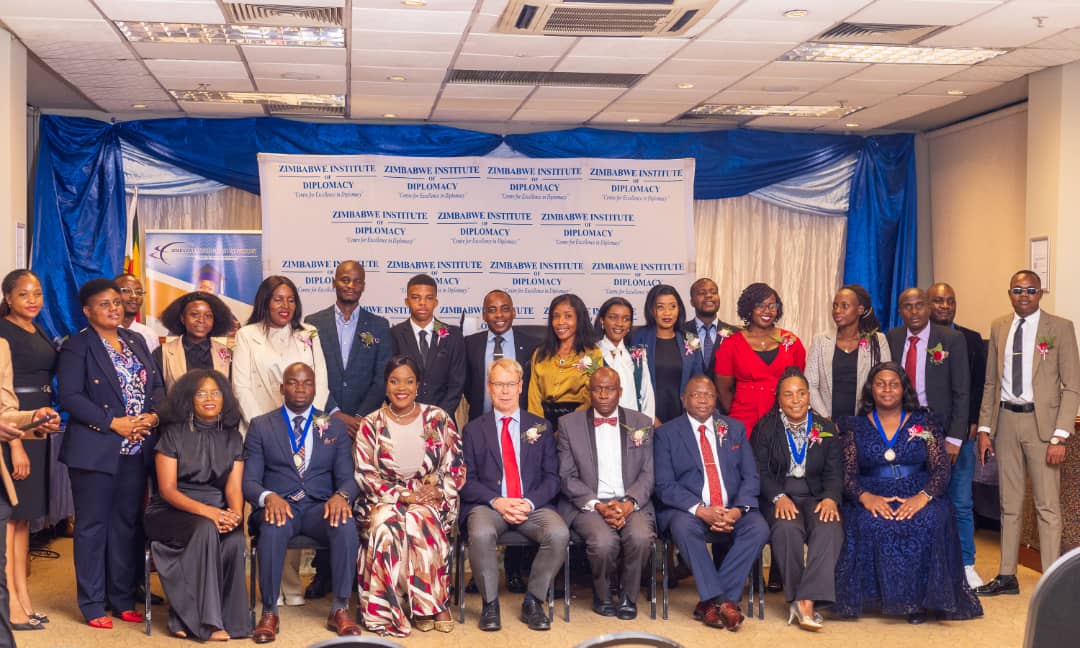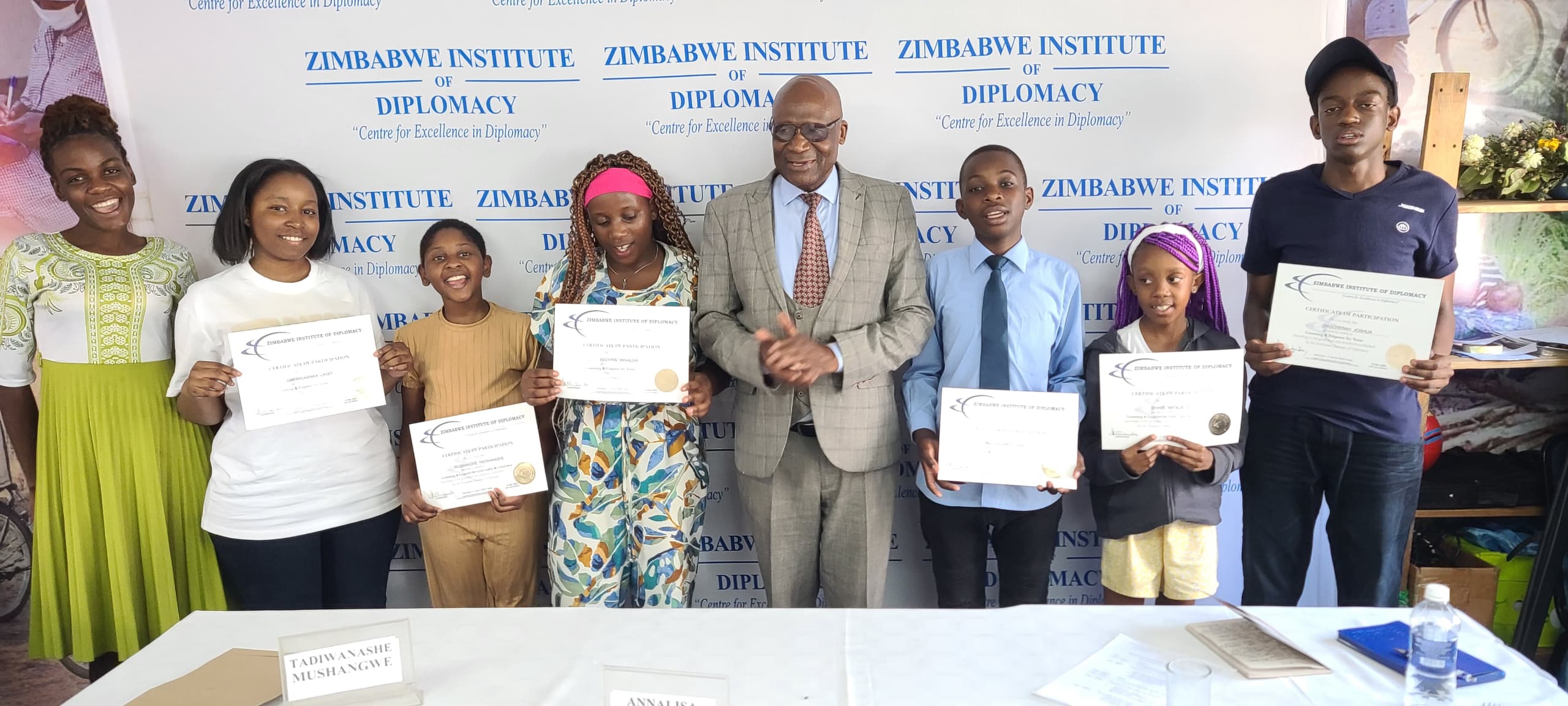The following questions were asked by Vicky Mlilo:
- What is the Significance of Africa Day
- How can African Countries come together to avoid dependency on the west?
- What needs to be done to ensure Africa benefits from its vast resources?
Mr V. A Chikanda, principal Lecturer at the Zimbabwe Institute of Diplomacy was given 5 minutes to answer the three questions live on Africa’s 54th Birthday. Mr Chikanda is pleased to add the following in response to these soul searching questions on Africa at 54:
It was a long and a bitter struggle; its success did not lie only on the ingenuity, courage and bravery of our founding fathers and departed heroes of our struggle but also rested on the willingness and efforts of the International Community through the United Nations. The creation of the United Nations (UN) in 1945 gave an impetus to the fulfillment of our dreams for independence and our aspirations for sovereignty and political and full economic freedom. Of critical significance was the 14 December 1960 UN Resolution 1514 which declared that subjugation, domination and exploitation constitutes a denial of fundamental human rights. The resolution went on to enounce the right to self-determination and the need to transfer all powers to the the people of that land regardless of race, creed or colour. All members of the UN were obliged to follow and live by the declaration.
We celebrate 25 May because on this date in Addis Ababa, Ethiopia, in 1963, 21 independent African States founded the Organisation of African Unity. Today there are 53 countries in the now called African Union. The foundation of the continental body created an African platform for political discourse and consensus building in issues affecting African Interests at the international fora. Africa started to speak with one voice in bilateral and multilateral institutions giving rise and consummation of African DIplomacy.
As we celebrate this day, we ask ourselves the questions; “What has Africa achieved at 54?” and “What is Africa known for at 54?”. On the positive side, though there a few pockets of continental hot spots and fighting in Somalia, Eritrea, the DRC to mention a few, African has achieved relative unity and stability. African states are supporting each other to fight enemies of democracy and terrorism.
What is worrisome and breathtaking is that still at her 54th birthday Mama Africa is still haunted by her underdevelopment in commerce, industry and agricultural production. 54 years experience seem to have gone down the drain as the continent is moving back into stagnation as a result of incompetent economic policies, failed economic programmes and inefficiency and the corruption scourge. What makes the situation worse is the fact that Africa continues to keep African Youth in the peripheries of economic empowerment and development. The Youth feel left out in the economic plan of the future of Africa. 75% of youth in Africa are out of employment. 50% of the youth are underdeveloped due to lack of exposure to the internet and new technologies. This is disturbing as statistical progression indicates that 40% of the World’s youth will be coming from Africa in the next 15 years. What will our Africa be?
We still continue to trade with the Northern countries than with ourselves. We are failing to promote inter-African trade. At 54 years, Africa is still known to be a continent`where corruption is rife. There are leaders who continue to enrich themselves while prejudicing the continent’s economic growth and development. Africa has equivocally been triumphant in practicing and promoting unity of the continent but corruption is inhibitive of African growth opportunities making Africa at 54 less loving, less caring and self destructive.
Africa is failing to harness the dividend of its youths. For example, in Zimbabwe, there is a high rate of unemployed youths. Needless to say, 40% of the world youths will be Africans in the near future and if we do not start to invest in youths, we will never realize the Africa we want. Any development that does not take into account the needs of the youths is not sustainable and against the laws of nature. As we celebrate the Africa Day, we must know that History must guide us. Our youth now know more than we do because of technological advancement in our ever-changing environment. We need old people for leadership and wisdom but the youth has a lot of physical and intellectual power that we should harness when there are still young and vibrant. Failure to exploit this low hanging resource is bedevilling and stifling Africa’s development agenda. Youths must now be at the forefront of developmental issues. Youth participation and partnership is of paramount importance to nation building elsewhere and in particular in Africa. .
At 54 years, let us revitalize our industries to better our economies. We should be able to farm and make our land more productive. Agriculture is set to alleviate African unemployment. It has the potential to employ more than three quarters of the African population due the ideal agricultural conditions. Africa can be the breadbasket of the world given the ease of farming in Africa. The climatic conditions in Africa are better than in Europe yet we fail to manage our land. As Zimbabwe, we are not going to apologize to anyone for taking our land from the minority white farmers but we need to utilize the land and offer commercial farming opportunities to investors.
Women cannot continue to be ignored if Africa has reach development targets. Exclusion of the majority of women in the mainstream economy is one of the fundamental mistakes Africa is making. We need to revisit our cultural values and upgrade the position of women in keeping with world development and women empowerment processes. In Zimbabwe there are 124 Women MP in a parliament of 350 seats. It is shameful that of the 124 seats 100 of them are given to women uncontested. Ultimately it means the women so just appointed do not wield sufficient political power. This, in a way is downgrading our women. We must reevaluate our culture and ways we bring the girl child. So we are able to nature the women with capacity equal to that of the boy child. Africa must therefore revisit the position of women in government, businesses and politics. Women cannot remain recipients of services in our societies but should also be stakeholders in decision making processes. We commend African countries that have already “achieved” gender parity.
We envision a prosperous Africa, based on inclusive growth and sustainable development; an integrated continent, politically united, based on the ideals of Pan Africanism and the vision of Africa’s Renaissance; an Africa of good governance, democracy, respect for human rights, justice and the rule of law; a Peaceful and Secure Africa; Africa with a strong cultural identity, common heritage, values and ethics; an Africa whose development is people driven, relying on the potential offered by people, especially its women and youth and caring for children and an Africa as a strong, united, resilient and influential global player and partner.
This article is written in response to the Chairperson of The Zimbabwe Institute of Diplomacy’s live interview on ZBC Main News by Ms Vicky Mlilo on Africa Day: 25/05/17




